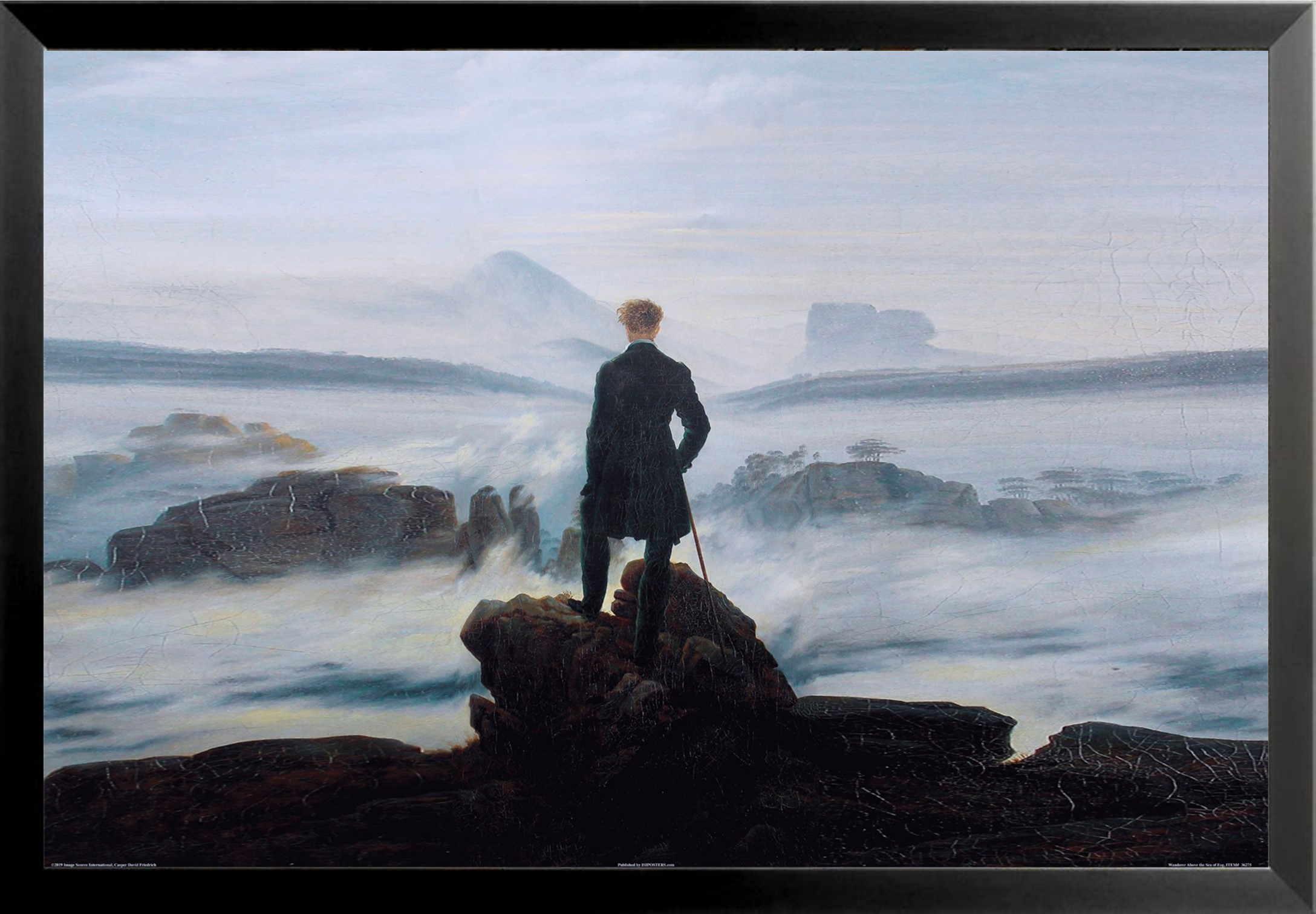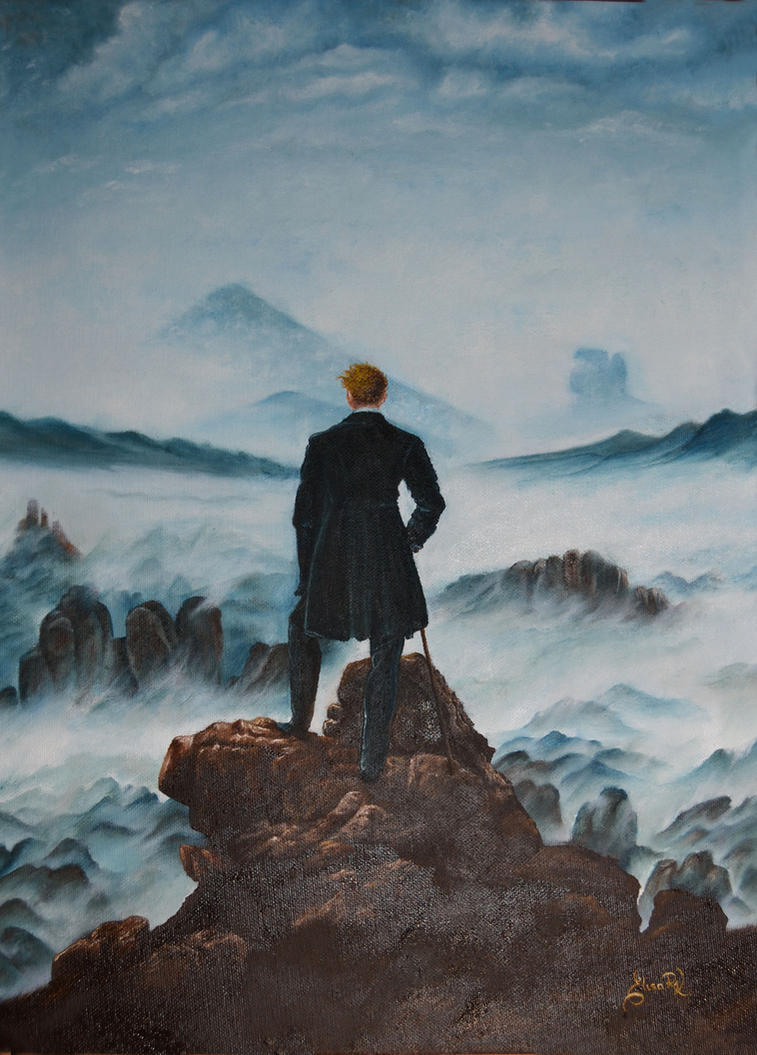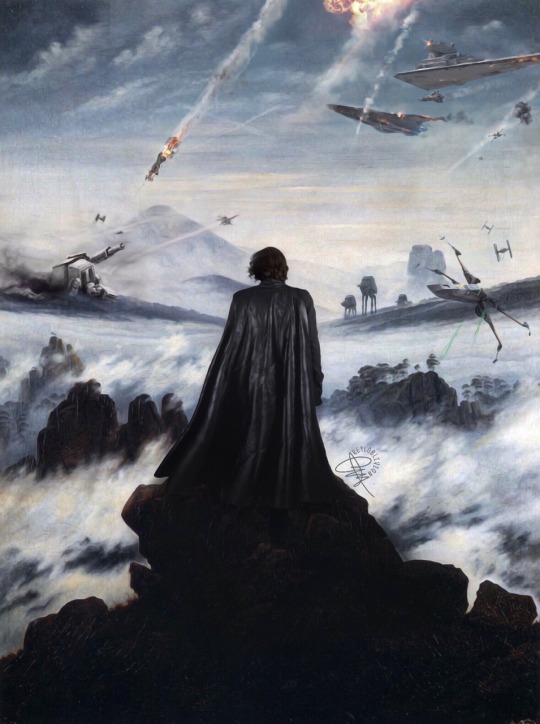
Caspar David Friedrich "Wanderer above the Sea Fog" 1818 ♄ Saturno
Wanderer above the Sea of Fog, or Der Wanderer über dem Nebelmeer, to give it it's original German title, is the most famous painting from the career of German Romanticist painter, Caspar David Friedrich. It was finished in 1818 and now resides at the Kunsthalle Hamburg in Hamburg, Germany.

Wanderer Above the Sea of Fog Caspar David Friedrich, Ivan Cruz, Figure
Wanderer Above the Sea of Fog, oil painting by German artist Caspar David Friedrich that was completed about 1818. It is regarded as one of the most representative and important works of the German Romantic movement. The sublime power of nature is a dominant theme in Friedrich's paintings.

THE WANDERER ABOVE THE SEA OF FOG ArtExpress
1. It was painted in the second decade of the 19th century. Wanderer above the Sea Fog is the most famous painting in the oeuvre of Caspar David Friedrich (1774-1840), the leading German artist of his time. He was born a year earlier than J.M.W. Turner (1775-1841), the English painter who specialized in landscapes and maritime paintings.

Reality Bites Bite 148 Caspar David Friedrich Wanderer above the
Caspar David Friedrich Wanderer above the Sea of Fog Wanderer above the Sea of Fog Date of Creation: 1818 Alternative Names: Wanderer Above the Mist, Der Wanderer über dem Nebelmeer Height (cm): 98.40 Length (cm): 74.80 Medium: Oil Support: Canvas Subject: Landscapes Art Movement: Romanticism Created by: Caspar David Friedrich Current Location:

Wanderer above a sea of fog by iwooshyou on DeviantArt
Wanderer above the Sea of Fog spotlights a landscape with a figure from behind. Friedrich accomplishes this meaning magnification with Rückenfigur. A favorite tool in his kit, there's inherent mystery in a turned back. It raises questions about the figure's identity. But it also forces us to focus on the setting.

Wanderer Wallpapers Wallpaper Cave
Wanderer Above the Sea of Fog (c. 1818) by Caspar David Friedrich has become an iconic painting depicting the depths of solitude. It is one of the finest examples from the German Romantic art movement and the one that we will discuss in more detail in this article. Table of Contents [ Show] Artist Abstract: Who Was Caspar David Friedrich?

FRAMED Wanderer Above the Sea of Fog 1818 by Caspar David Friedrich
Description In the foreground, a man stands upon a rocky precipice with his back to the viewer. He is wrapped in a dark green overcoat, and grips a walking stick in his right hand. [3] His hair caught in a wind, the wanderer gazes out on a landscape covered in a thick sea of fog.

Behind the Art Why is Wanderer above the Sea of Fog by Caspar David
Title: Wanderer above the Sea of Fog German: Der Wanderer über dem Nebelmeer Also: Wanderer above the Mist or Mountaineer in a Misty Landscape Artist: Caspar David Friedrich Medium: Oil on canvas Date: 1817 Dimensions: Height: 98 cm (38.5 ″); Width: 74 cm (29.1 ″) Museum: Kunsthalle Hamburg Caspar David Friedrich Name: Caspar David Friedrich

"Wanderer above the Sea of Fog revisited " Framed Art Print for Sale by
The wanderer above the sea of fog is a Romantic Oil on Canvas Painting created by Caspar David Friedrich in 1818. It lives at the Kunsthalle Hamburg in Germany. The image is in the Public Domain, and tagged Seascapes. Download See The wanderer above the sea of fog in the Kaleidoscope Where is the Wanderer?

Wanderer above the sea of fog by Elisallysa on DeviantArt
Wanderer above the Sea of Fog ( Der Wanderer über dem Nebelmeer ), also known as Wanderer above the Mist or Mountaineer in a Misty Landscape, is an oil painting c. 1818 by the German Romantic artist Caspar David Friedrich. It has been considered one of the masterpieces of Romanticism and one of its most representative works.

Wanderer Above The Sea Of Fog / Wanderer above the Sea of Fog by
"The Wanderer above the Sea of Fog" is a masterpiece of Friedrich's allegorical landscapes in which a lonely figure is silhouetted against a powerful and moving background. Painters and philosophers of the time reevaluated humanity's place in the world and their works reflected newfound respect for nature. Throughout his oeuvre, Caspar.

Wanderer Above the Sea of Fog, 1818, Caspar David Friedrich IN
"Wanderer above the Sea of Fog" by Caspar David Friedrich is a painting rich in symbolism, inviting viewers to explore its hidden meanings and profound allegories. Decoding these symbols unveils the intricate narrative woven into the fabric of the artwork, providing insights into the human condition and the relationship between man and nature.

Wanderer Above The Sea of Fog by Caspar David Friedrich 1818 Solitude
Wanderer above the Sea of Fog is the quintessential Romantic artwork. The aesthetic began as a reaction against the Enlightenment values (logic, rationality, order) that partially contributed to the bloody, monarch-toppling French Revolution of 1789.

Wanderer Above The Sea Of Fog Painting at Explore
Wanderer above the Sea of Fog. It is probably the best-known painting of German Romanticism: The "Wanderer over the Sea of Fog", created around 1818 by Caspar David Friedrich (1774-1840). The work shows a well-to-do hiker with a frock coat and walking stick standing on a rock in contemplation of a landscape of partly bizarrely shaped mountain.

Wanderer above sea of fog by PawelUchorczak on DeviantArt
Caspar David Friedrich, Wanderer Above the Sea of Fog, 1818 (Before diving into this post, make sure to pick up a copy of my free Landscape Painting Starter Kit .) Key Facts and Ideas It is also referred to as Wanderer Above the Mist or Mountaineer in a Misty Landscape. The identity of the man is uncertain.

friedrichwandererabovetheseaoffog1200×10242 FORDHAM POLITICAL
Wanderer above the Sea of Fog in its "iconic symbolism of self-reflection on an uncertain future" is a "fitting visual metaphor" that was popular among artists and philosophers of that time (Robinson, 2020, p. 1). The context in which the painting was written had a significant impact on how it turned out to look.